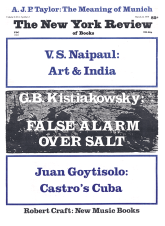In response to:
Pudding Stone from the February 8, 1979 issue
To the Editors:
Helen Vendler accuses me of attempting to go “behind” Robert Lowell’s poetry, so I will refrain from speculating what could lie behind her extraordinarily vindictive review of my book Robert Lowell: Life and Art (NYR, February 8). For whatever it’s worth, Lowell liked the portions of my book that he read in manuscript; thought that my style was “fine”; and in his last letter to me, written weeks before his death, wished me “good luck with your book.” That matters infinitely more to me than the polemics of his posthumous spokesman.
Vendler’s review gives no hint that my book is based on years of scholarly research. Rather, she focuses on the book’s critical statements, and chides me for not writing the book she would have written. But curiously, she also chides me for having written the book she would have written. She contradicts me with my own ideas, restated in her language. One example of this syndrome will suffice. She writes that I misrepresent Lowell’s late practice, which she calls
profoundly irreligious, reality-bound, ordered not by any structural teleology but by a confidence in free association, addressed not homiletically to an audience, but painfully to the self, private rather than public,…free to seem desultory and uncomposed, and, above all, exempt from the tyranny of the well-made.
I myself describe Lowell at the end of his career seeking
a new artistic freedom—the freedom to focus, without artifice, on his daily moments as they really are…. The “Day by Day” sequence is probably the most completely personal work Lowell ever wrote…. The poems, developing through a process close to free association, bring content from his unconscious into the light of consciousness. At the same time they also look intensely at the outer, factual world, as Lowell rejects the abstractness of History and The Dolphin. The poet’s great autobiographical venture thus concludes quietly, in fragments of free verse that are at once private and transparent. The circus animals have not exactly deserted, they have been put back in the cage, and the ringmaster stands alone in the ring, leaning for support, speaking softly as himself.(p.234)
Despite occasional slips in discipline, Vendler is essentially committed to viewing literature as a self enclosed, non-referential verbal system, and is intolerant of any view-point that differs. Her intolerance leads her into some odd positions. For example, she questions my premise, which I would have thought self-evident, that Lowell’s middle and later poems bear a more overt relationship to the facts of his personal life than do the early poems. She objects, “data—not ‘life’ but data—are essential to the Lowell poem…. In this respect, the later verse does not differ very much from the verse of the early or middle years; it is only that the data are his daughter’s gerbils or his wife’s letters instead of Roman history or neo-Thomism.” One would have thought that “only” worthy of some extended comment. But in fact, it is not “only” the data that has altered; it is also the way of perceiving and presenting data that has altered. And as Blake says, the eye altering alters all. Any Lowell reader will know that his poetic changes involve vision and language at least as much as they involve data, though the three cannot be easily disconnected. (Incidentally, what can Vendler mean by saying that Lowell “is constituted” by data? Is he a computer? Here as elsewhere, she pushes a potentially valid perception to the point of absurdity.)
Vendler basically feels that Lowell’s work is not “more centrally about ‘life’ than any other poetry. Even autobiography is not, except to the naive eye, more ‘about’ life than any other genre.” This just goes against common sense. Lowell himself thought that his poetry represented a “breakthrough back into life” (interview with Seidel), in the sense that it overtly questions the myth of the poem as autonomous “object.” No one thinks that a Lowell poem is merely “candid transcription”—a formulation of Vendler’s that distorts my argument by making me sound like a proponent of empirical realism. Rather, a Lowell poem explores its ties to the psyche and environment that created it. These explorations grew in complexity and grace as Lowell’s career progressed. But that is the topic of my book.
I’m not sure whether Vendler is right in thinking that I tried to go “behind” Lowell’s poetry. I did try to penetrate the elusive relationships subsisting between his conscious life and his art—in order to see the poetry (and the life too) in a truer light. My book contains everything I know about Lowell, and much of what I feel. I ask anyone interested in Lowell to look at other, more dispassionate reviews, or at the book itself.
Steven Gould Axelrod
University of Colorado
Boulder, Colorado
Helen Vendler replies:
When presented with a book written by a stranger or a friend, one speaks of the value that one finds, and one risks the infliction of pain, which is inevitably, at times, part of the process. Reviewers are themselves reviewed.
This Issue
March 22, 1979



